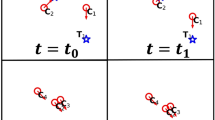Abstract
This paper deals with cooperation for virtual reality applications. In a multi-agent system, cooperation between agents is an important element to solve a common task, which is very difficult or impossible for a single agent or a group of agents without cooperation. Hence we focus on cooperation in the predator-prey problem where a group of programmed and learning predators coordinates their actions to capture the prey. These actions of a learning predator are dynamically weighted by a behavioral system based on motor schemas and classifier systems. At each instant, the system must modify the weights in order to enhance the strategies of the group, as surrounding a prey. Thanks to the classifier system the learning predator learns situations and gradually adapts its actions to its environment. First encouraging results show that coupling such systems gives very efficient performances in dynamic environments.
Preview
Unable to display preview. Download preview PDF.
Similar content being viewed by others
References
Arkin, R.C.: Behavior-based robot navigation for extended domains. Adaptive Behavior 2(1), 201–225 (1992)
Blumenthal, H.J., Parker, G.B.: Co-Evolving Team Capture Strategies for Dissimilar Robots. In: The AAAI 2004 Symposium on Artificial Multiagent Learning, Washington, DC (October 2004)
Bull, L.: A Simple Accuracy-based Learning Classifier System. UWELCSG03-005 (2003)
Clark, R.J., Arkin, R.C., Ram, A.: Learning Momentum: On-line Performance Enhancement for Reactive Systems. In: Proceedings of the 1992 IEEE International Conference on Robotics and Automation, Nice-France (May 1992)
De Jong, E.D.: An Accumulative Exploration Method for Reinforcement Learning. In: Notes of the AAAI 1997 Workshop on Multiagent Learning, AAAI technical report WS-97-03 (1997a)
De Jong, E.D.: Multi-Agent Coordination by Communication of Evaluations. In: Boman, M., Van de Velde, W. (eds.) MAAMAW 1997. LNCS, vol. 1237. Springer, Heidelberg (1997b)
De Jong, E.D.: Coordination Developed by Learning from Evaluations. In: Padget, J. (ed.) Collaboration between Human and Artificial Societies 1997. LNCS (LNAI), vol. 1624. Springer, Heidelberg (1999)
Holland, J.H.: Escaping Brittleness: The Possibilities of General-Purpose Learning Algorithms Applied to Parallel Rule-Based Systems. In: Mitchell, M., Carbonell, J.G. (eds.) Machine Learning, an Artificial Intelligence Approach, ch. 20, vol. II, pp. 593–623. Morgan Kaufmann, San Francisco (1986)
Katagami, D., Yamada, S.: Real robot learning with human teaching. In: Fourth Japan-Australia Joint Workshop on Intelligent and Evolutionary Systems, pp. 263–270 (2000)
Miller, G., Cliff, D.: Co-evolution of pursuit and evasion I: Biological and game-theoretic foundations. Technical Report CSRP311, School of Cognitive and Computing Sciences, University of Sussex, Brighton, UK (1994)
Nakano, R.: Efficient Learning of Behavioral Rules. In: From Animals to Animats 6: SAB 2000 Proceedings Supplement of the Sixth International Conference on Simulation of Adaptive Behavior, Paris, France, pp. 178–184 (2000)
Panatier, C., Sanza, C., Duthen, Y.: Adaptive Entity thanks to Behavioral Prediction. In: From Animals to Animats 6: SAB 2000 Proceedings Supplement of the Sixth International Conference on Simulation of Adaptive Behavior, Paris, France, pp. 295–303 (2000)
Parker, G.B.: Punctuated Anytime Learning for Hexapod Gait Generation. In: Proceedings of the 2002 IEEE/RSJ International Conference on Intelligent Robots and Systems (IROS 2002), pp. 2664–2671 (2002)
Ram, A., Arkin, R.C., Boone, G., Pearce, M.: Using genetic algorithms to learn reactive control parameters for autonomous robotic navigation. Adaptive Behavior 2(3), 277–304 (1994)
Sanza, C., Panatier, C., Duthen, Y.: Communication and Interaction with Learning Agents in Virtual Soccer. In: Heudin, J.-C. (ed.) VW 2000. LNCS (LNAI), vol. 1834, p. 147. Springer, Heidelberg (2000)
Stolzmann, W.: Anticipatory Classifier Systems. In: Koza, J.R., et al. (eds.) Genetic Programming 1998: Proceedings of the Third Annual Conference, University of Wisconsin, Madison, Wisconsin, July 22-25, pp. 658–664. Morgan Kaufmann, San Francisco (1998)
Tran, T.H., Sanza, C., Duthen, Y.: Study of the anticipatory system in simulation. In: 3IA 2004, 7th International Conference on Computer Graphics and Artificial Intelligence, Limoges, France (May 2004)
Wilson, S.W.: Classifier Fitness Based on Accuracy. Evolutionary Computation 3(2), 149–175 (1995)
Yong, C.H., Miikkulainen, R.: Cooperative Coevolution of Multi-Agent Systems. Technical Report AI-01-287 (February 2001)
Author information
Authors and Affiliations
Editor information
Editors and Affiliations
Rights and permissions
Copyright information
© 2005 Springer-Verlag Berlin Heidelberg
About this paper
Cite this paper
Tran, T.H., Sanza, C., Duthen, Y. (2005). Learning Cooperation from Classifier Systems. In: Hao, Y., et al. Computational Intelligence and Security. CIS 2005. Lecture Notes in Computer Science(), vol 3801. Springer, Berlin, Heidelberg. https://doi.org/10.1007/11596448_47
Download citation
DOI: https://doi.org/10.1007/11596448_47
Publisher Name: Springer, Berlin, Heidelberg
Print ISBN: 978-3-540-30818-8
Online ISBN: 978-3-540-31599-5
eBook Packages: Computer ScienceComputer Science (R0)




